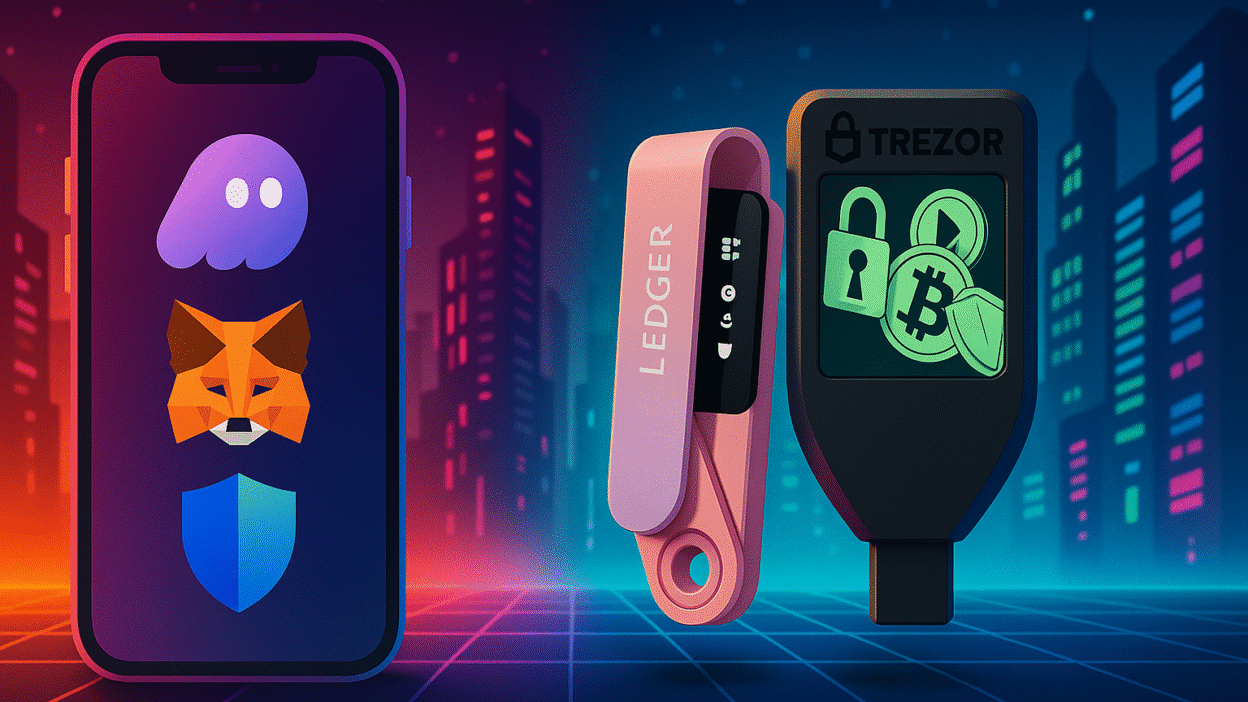So, you finally took the leap into crypto, bought your first bit of Bitcoin or Ethereum, and now you’re sitting here wondering: “How do I keep this stuff safe?” Smart move. If you’re thinking about security this early, you’re already ahead of half the crypto degens out there.
Let’s talk wallets—crypto wallets. But first, relax, we’ll keep this chill, simple, and practical. By the end of this 7-minute read, you’ll know exactly what type of wallet you need and why it matters. Let’s get into it.
Crypto Wallets: What Are They Really?
Let’s make sure you’re clear on one thing: Crypto wallets don’t store coins. Wait, what? Yes, your crypto lives permanently on the blockchain, not inside your wallet.
So, what’s a wallet, then? Think of it as your personal crypto keychain. It securely stores two keys:
- Public Key: Like your crypto username.
- Private Key: Your crypto password (NEVER share this).
Owning a wallet means you control your keys. And in crypto, keys = power. Lose them, and you lose your crypto. Protect them, and you’re golden.
Hot Wallets: Convenient, Fast, But Slightly Risky
A hot wallet is a crypto wallet connected to the internet. Think MetaMask, Trust Wallet, or Exodus. Easy setup, easy use, easy crypto spending.
Pros of Hot Wallets:
- Convenient for daily trading.
- Easy-to-use apps or browser extensions.
- Perfect for smaller amounts of crypto you use regularly (think grocery money, but for crypto).
Cons of Hot Wallets:
- Connected online = vulnerable to hacks.
- If your phone or computer gets compromised, your crypto could vanish faster than your paycheck on NFT drops.
Popular Hot Wallets:
- MetaMask: A favorite among Ethereum degens; great for interacting with DeFi apps and NFT marketplaces.
- Trust Wallet: A popular choice for newbies, supporting multiple blockchains—simple, reliable, but remember, it’s still online.
Cold Wallets: Secure AF, but Less Convenient
Cold wallets (or hardware wallets) are your crypto fortress. They’re offline, ultra-secure devices specifically designed to protect your crypto. Think Ledger Nano S/X or Trezor.
Pros of Cold Wallets:
- Unmatched security (hackers cry themselves to sleep because they can’t touch this).
- Ideal for holding larger amounts of crypto or long-term investments.
- Immune from online phishing or malware attacks—assuming you don’t hand your private keys over voluntarily (please don’t).
Cons of Cold Wallets:
- Slightly less convenient—requires a physical device for transactions.
- Small learning curve (but hey, that’s the crypto journey).
Popular Cold Wallets:
- Ledger Nano X/S: Sleek, user-friendly, and battle-tested by crypto OGs.
- Trezor Model T: Easy setup, open-source, trusted by the paranoid (which is a good thing).
Hot vs Cold Wallet: Which One is Safer?
Honestly, it’s not even close—cold wallets win hands down in security. But does that mean hot wallets are useless? Nope. The smartest move is a combo strategy:
- Hot Wallet: Keep small amounts for quick access, daily trading, or casual NFT buys.
- Cold Wallet: Store your serious stash here. This is your crypto vault—secure it like your future depends on it (because it might).
Quick Scenario: Hot and Cold in Action
Let’s imagine this real quick: you’re browsing NFTs at 2 a.m. (been there), and suddenly you find the perfect JPEG. If you had all your crypto stashed in a cold wallet, you’d need to get your physical device out, plug it in, and authorize transactions—too much friction. For smaller transactions, a hot wallet does the trick instantly.
On the other hand, say you cashed out some nice gains after your favorite coin mooned. You’re not gonna leave those precious profits in a hot wallet exposed to internet threats. Nope, transfer them straight to your cold wallet. Safe and secure, ready for the next bull run.
Keeping Your Crypto Secure (Simple Steps):
Here are some quick rules every crypto user should live by:
- Never Share Your Private Keys: Seriously, ever. Not even if Vitalik himself asks you (he won’t).
- Use Two-Factor Authentication (2FA): On exchanges, wallets, everything.
- Buy wallets directly from the Manufacturer: Avoid Amazon or eBay. Fake wallets exist. Don’t become a meme.
- Backup Recovery Phrases: Write down your recovery phrase clearly and store it safely offline.
The Bottom Line: Which Crypto Wallet Should You Get?
Here’s the quick breakdown:
- If you’re actively trading or using crypto frequently—hot wallets make life easier.
- If you’re storing significant crypto holdings or planning long-term investments—cold wallets are a must.
Smartest choice? Get both. That way, you cover daily convenience while securing your long-term crypto stack.
Stay Safe and Stay Degenerate
Crypto is exciting, profitable, risky, and chaotic—often all at once. Wallets might seem boring, but setting up your security for a few minutes can prevent future heartache.
So pick your wallet(s), set it up properly, and rest easy knowing your crypto isn’t just floating around waiting to get rugged. You’re now ahead of 90% of people who jump in blindly.
Welcome to the secure side of crypto. Now get back out there, stay safe, and keep stacking.
Hot vs Cold Crypto Wallets: Which Is Safer?
The content, Hot vs Cold Crypto Wallets: Which Is Safer?, published on Mugen:City is for informational and entertainment purposes only.
We do not offer financial advice, investment recommendations, or trading strategies.
Cryptocurrencies, NFTs, and related assets are highly volatile and risky — always DYOR (do your own research) and consult with a professional advisor before making any financial decisions.
Mugen:City, its writers, and affiliates are not responsible for any losses, damages, or financial consequences resulting from your actions.
You are fully responsible for your own moves in the degen world. Stay sharp, stay rebellious.





